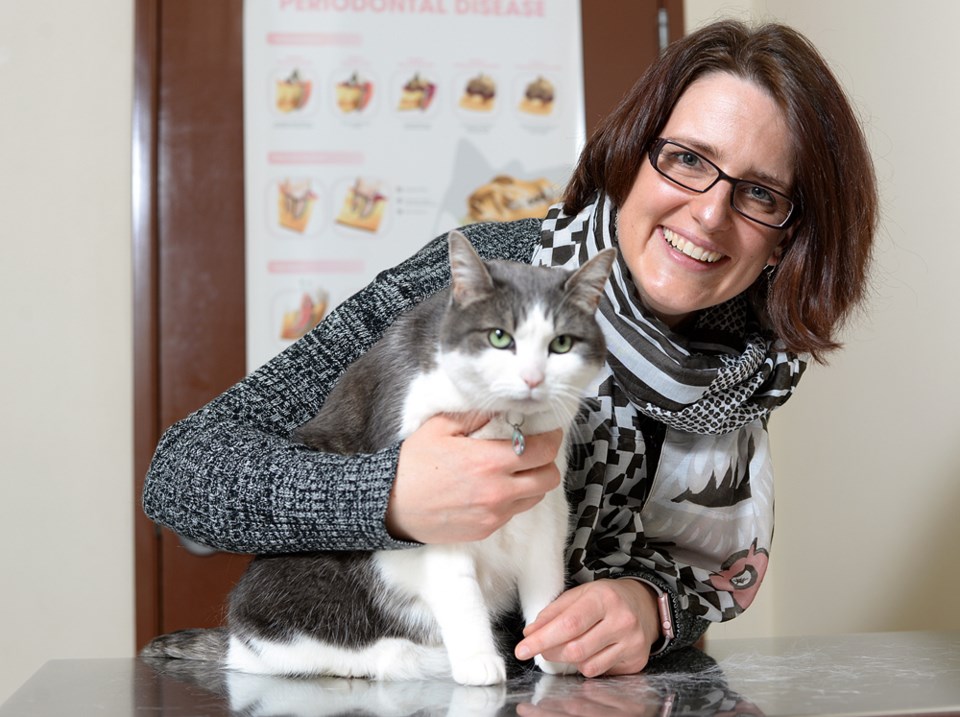Claudia Richter runs her own clinic – the Burnaby Veterinary Hospital – and every year, she donates her time for Vets in Action, a one-day blitz providing free care for abandoned or homeless pets. The Burnaby SPCA branch provides the cats and dogs, and Richter organizes a small army of vets, assistants and techs for a day of free spaying, neutering and dental work. Some even recruit their spouses as volunteer drivers, shuttling animals back and forth from the SPCA. Vets in Action was Richter’s idea. She started it three years ago, treating roughly 30 animals with procedures totalling an estimated $20,000 to $30,000. The Burnaby SPCA branch loved the idea so much they named her vet of the year in 2013. Richter hopes other vets pick up the torch and spread Vets In Action across the province.
This year’s event takes place on April 10 at her clinic on Springer Avenue. We chatted with Richter about some of the best and worst parts of being a veterinarian.
Q&A:
What’s the most rewarding part of your job?
Everyone wants to say puppies! (laughter) The most rewarding thing is when we do something – for example, the other week I did a dentistry, and we pulled a bunch of teeth on a little dog. The first time I ever saw him, he came in and he was trying to bite me, every time I tried to look at his mouth. Then after the dentistry - we pulled a whole bunch of teeth out of his mouth - and he came back a week later, and he didn’t want to bite me anymore. He was a really, really nice dog. He was in pain, and he was uncomfortable, right? The most rewarding is (when) you see an animal come back and you’ve helped them, and they come back and they are so much happier.
What’s the hardest thing about your job?
Euthanasia is hard. Helping animals have a way of passing that’s a little more graceful and without pain and ending suffering is sort of more how I see it.
I find it harder when I know there’s an animal that I could help but I can’t, and it’s because of money, or because of somebody’s beliefs sometimes. That’s tough. If someone doesn’t believe me that this animal is in pain, and I try to convince them - that’s tough.
You donate tens of thousands of dollars every year in free care for Vets In Action. Why do you do it?
If you come there, … the place is just buzzing. It’s just amazing - the compassion and these people in one place there to just help these animals. The SPCA doesn’t have the funds all the time to treat them right away. So putting them ahead, with that much money, that’s huge. And these animals are finding homes a lot quicker if they are feeling well, right? If you’re not feeling great, you’re not going to be the one wagging your tail, wanting to be adopted. … and maybe you’ll get overlooked.
Do you think people should always get their pets spayed or neutered?
Absolutely.
What about pit bulls? They have a bad rep, and some people want bans on certain breeds. Does that work?
I don’t believe in breed bans. I think it has been proven all over the world that that has never worked. We have many, many pit bulls in our clientele, and they are generally lovely, lovely dogs.
You’re trying to help animals with medical care if they are suffering. It’s very similar to what doctors do with people. Why did you chose the veterinarian route instead of the doctor route?
I am terrified of needles. (laughs) I’m actually serious. Just thinking about having to give a needle to a person or getting a needle myself makes me sweat. My dad is a doctor. I grew up in a family where I was exposed to that, but yeah. When I first told my parents I was going to be a veterinarian, they were laughing at me: “You’re afraid of needles!” Yep, but when it comes to animals, it’s a different feeling for me.
Do you have any animals yourself?
Oh yes, I have two dogs and a cat. And I usually have some kind of foster. We have a little dog that was surrendered. And we have a cat at the clinic as well. So I consider those my animals, too, but everyone at the clinic would say the same thing.
Anything else?
I should probably thank all the amazing volunteers that come out every year.



